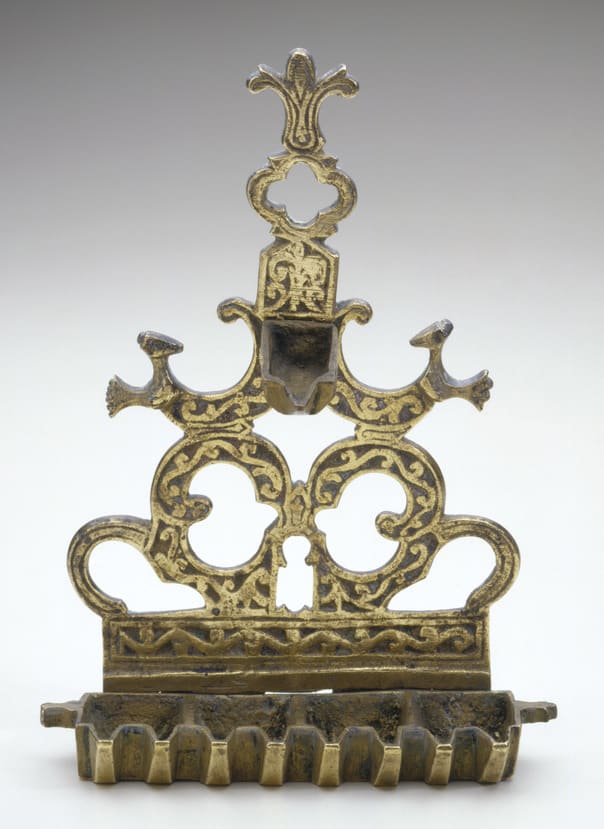
- Object Name:
- Hanukkah Lamp
- Place Made:
- Central Anti-Atlas Mountains (?) (Morocco)
- Date:
- 19th-early 20th century
- Medium:
- Copper alloy: cast and enameled
- Dimensions:
- 8 × 5 3/4 × 2 5/8 in. (20.3 × 14.6 × 6.6 cm)
- Credit Line:
- Gift of Dr. Harry G. Friedman
- Accession Number:
- F 2467
Not On View
This lamp belongs to a cast group made in the Atlas Mountains whose surface is ornamented with vinework executed in thick raised lines. The enamel that fills the voids left by the raised decoration is a rare survival on Moroccan Hanukkah lamps; it is typical of work in the Central Anti-Atlas Mountains, found, for example, on rifles and daggers of the nineteenth century.
Lamps with similar open scrollwork containing two kidney-shaped spaces in the center were also made in Italy and eastern Europe, where they had different finials and there were generally no birds. The origin of the type has been attributed to fifteenth-century Italy, but such an early date requires further documentation. Connections between North Africa and Italy were strong from the seventeenth century on, particularly with Livorno. Jews from that community came to live in nearby Algeria and Tunisia, and Livornese Jews controlled Algerian trade. Italian Jews were also found in eastern Europe, having arrived in Poland and Lithuania after major disruptions further west in the fourteenth and fifteenth centuries. In turn, Polish Jews were important in trade with Venice from the fifteenth century on. These interconnections between Italy and North Africa on the one hand, and Italy and eastern Europe on the other, suggest mechanisms by which this scrolled lamp form might have attained such a disparate distribution.
A number of distinctly Moroccan features have been added to transform this lamp into an Islamic type: the two birds, the arabesques covering every inch of the surface, the horseshoe arch in the center, and the oil containers, which consist of four large wells with two spouts each. Other versions of this type with different surface decoration were found in the northern Atlas Mountains further to the west, in such cities as Demnat, indicating the wider distribution of the form.
Lamps with similar open scrollwork containing two kidney-shaped spaces in the center were also made in Italy and eastern Europe, where they had different finials and there were generally no birds. The origin of the type has been attributed to fifteenth-century Italy, but such an early date requires further documentation. Connections between North Africa and Italy were strong from the seventeenth century on, particularly with Livorno. Jews from that community came to live in nearby Algeria and Tunisia, and Livornese Jews controlled Algerian trade. Italian Jews were also found in eastern Europe, having arrived in Poland and Lithuania after major disruptions further west in the fourteenth and fifteenth centuries. In turn, Polish Jews were important in trade with Venice from the fifteenth century on. These interconnections between Italy and North Africa on the one hand, and Italy and eastern Europe on the other, suggest mechanisms by which this scrolled lamp form might have attained such a disparate distribution.
A number of distinctly Moroccan features have been added to transform this lamp into an Islamic type: the two birds, the arabesques covering every inch of the surface, the horseshoe arch in the center, and the oil containers, which consist of four large wells with two spouts each. Other versions of this type with different surface decoration were found in the northern Atlas Mountains further to the west, in such cities as Demnat, indicating the wider distribution of the form.
Information may change as a result of ongoing research.